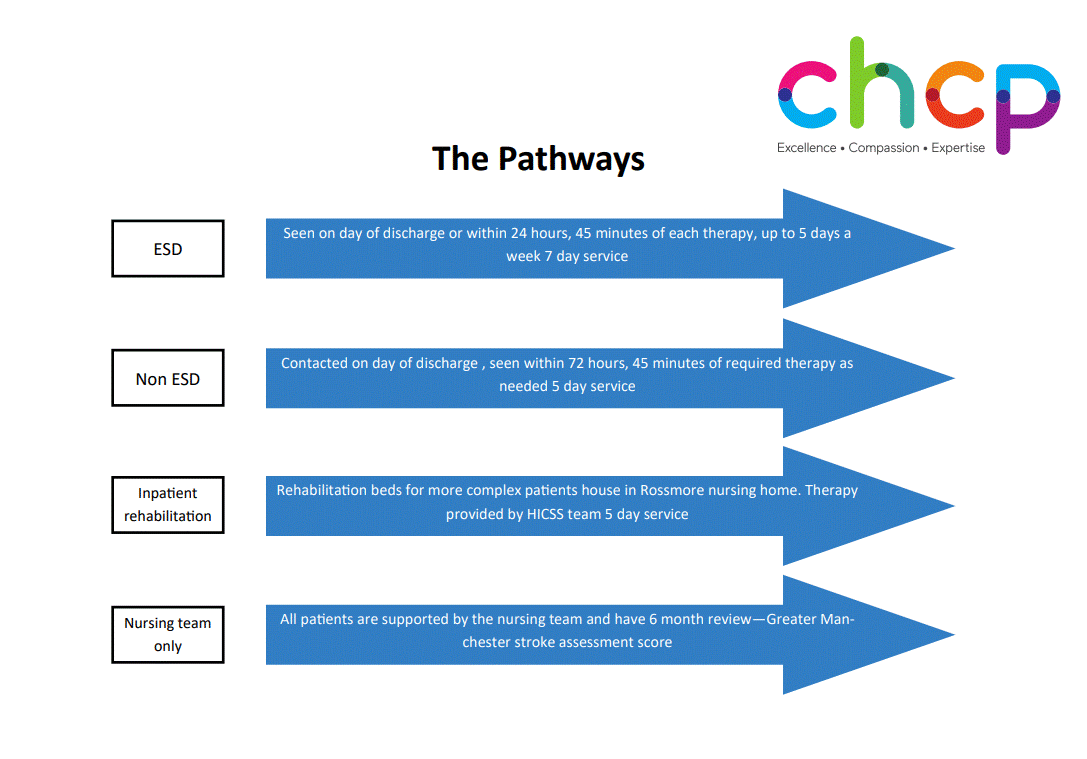Stroke
Definition/Description
Patients are appropriate for this pathway if they have a diagnosed stroke and have rehabilitation potential.
The stroke rehabiliation pathway has two elements;
1. Early Supported Discharge (ESD) - in patients own home or usual place of residence. This can only be accessed via acute care (HRI).
2. Specialist stroke rehabilitation (not ESD) in community stroke rehabilitation units, long term care settings and patient’s own home. This is the pathway GP's can refer to.
Red Flag Symptoms
This pathway is not suitable for patients with acute symptoms suggesting stroke or TIA.
Stroke patients with a dominant co-morbidity may be treated on that condition’s pathway rather than the stroke rehabilitation pathway but if they become suitable/eligible for support by the Integrated Community Stroke Rehabilitation they can then be referred .
Patients who are recognised as being at the end of their life should be managed in accordance with the End of Life care Strategy. Agreement should be reached via the MDT process with the stroke survivor and family regarding the extent to which they require access to the HICSS.
Exclude Red Flag Symptoms
A stroke related deterioration in swallowing would require immediate referral to the Stroke Team for assessment.
Do Not Refer
Do not refer patient with acute symptoms which could be suggestive of stroke/TIA, patients who are not medically stable or patients on the EOL pathway for whom stroke rehabilitation is not appropriate.
Guidelines on Management
GP's can refer patients from primary care who experience a deterioration in function which is directly related to a previous stroke.
Referral Criteria/Information
Referrals to the Integrated Community Stroke Rehabilitation Service will be primarily identified through an MDT process in conjunction with the Hull & East Yorkshire Hospitals NHS Trust multidisciplinary stroke team, as part of the stroke pathway. Patients meeting the eligibility criteria for the Integrated Community Stroke Rehabilitation Service may also be referred from other Trusts where they may have been receiving care in the acute phase following a stroke. Referrals will be accepted from any health or social care professional using the designated referral system. Patients who experience a deterioration in function directly related to a previous stroke may be referred by referral form to the Stroke Team.
Referral criteria – Non ESD pathway
- The stroke survivor is 18 years or older
- Be a local resident or registered with a local GP as agreed by local commissioners
- The stroke survivor has a primary diagnosis of stroke
- The stroke survivor requires specialist stroke rehabilitation due to stroke being the main presenting problem
- The stroke survivor is medically stable (i.e. has no other underlying medical problems or conditions which would preclude active participation in rehabilitation)
- The stroke survivor is able to be maintained safely in one of the Stroke Community Rehabilitation Units or in their own home/usual place of residence
It is not likely that GP's would refer to the ESD pathway but for reference criteria is as follows:
- The stroke survivor is 18 years or older
- Be a local resident or registered with a local GP as agreed by local commissioners
- The stroke survivor has a primary diagnosis of stroke
- The stroke survivor requires specialist stroke rehabilitation due to stroke being the main presenting problem
- The stroke survivor is medically stable for transfer from hopsital to home (i.e. has no other underlying medical problems or conditions which would preclude active participation in rehabilitation)
- Consent to early supported discharge with agreement from their carer(s)
- Be engaged with rehabilitation programme and goals identified prior to discharge from hospital
- Be able to mobilise and transfer safely independently or with support from a trained carer with or without equipment (risk assessment undertaken)
- Need no overnight assistance that their family / carers cannot support
- Environment assessed as safe by MDT and able to deal with emergencies
- Have effective management plans in place for continence, pressure areas and nutritional risk
- Have good social support in place (depending on the needs of the individual)
Referrals
The main route of referral for ESD is via the MDT on the acute stroke unit at HRI.
GPs can refer patients via a referral form to the Stroke Team.
Any Other Information
As per referral form; name, DOB, address, contact numbers, NHS number, NOK, residential details, details of stroke, PMH, medication, stroke consultant, GP, reasons for referral, current abilities,other agencies involved, any further information, date of dishcharge.
The Rehabilitation team includes: specialist nurses, physiotherapists, occupational therapists, speech and language therapists, social workers, psychologists. Patients and carers can access a stroke education programme which is 8 weeks long. Patients who have no other rehab needs can access this course. A DVD is available to support the education of patients. There is a central point of contact number for patients and health care professionals.
Associated Policies
Specialties
Places covered by
- Hull
Hospital Trusts
